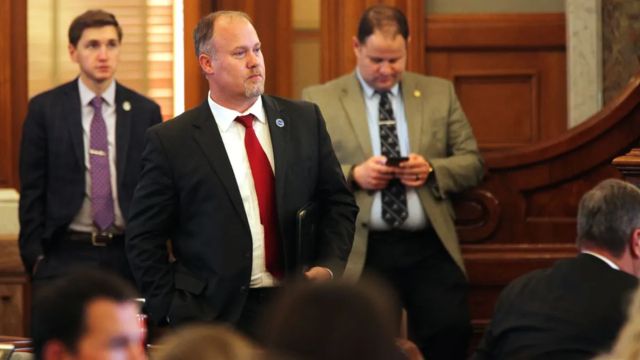The House took action following the Senate’s approval of the plan by a vote of 38-1. Normally, this would have been a positive sign for the House vote. However, it was evident that many House Democrats intended to vote against the plan from the start. Additionally, House Republicans held a private meeting outside the Statehouse before the vote, presumably to strategize and garner support for the plan among their colleagues.
Senate President Ty Masterson, a Republican from the Wichita area, announced that the Legislature will not be discussing any new tax plans during this week. The lawmakers are scheduled to adjourn on Friday for a three-week spring break and will reconvene on April 29 for a brief period to conclude the remaining business for the year. Masterson mentioned that they might consider another tax plan during that time.
Kansas witnessed similar events to that of Georgia, where the Republican-controlled Legislature recently approved personal and corporate income tax reductions that were favored by GOP Governor Brian Kemp. The state of Kansas also boasts a significant budget surplus, with projections estimating it to exceed $4 billion by the end of June 2025.
According to the conservative Tax Foundation, several other states reduced their income tax rates last year. However, in Kansas, major tax cuts were prevented due to a disagreement between Republican leaders and Kelly. The dispute arose over a GOP proposal for a single-rate, “flat” income tax, which Kelly argued would primarily benefit the “super wealthy.”
In January, Governor Kelly vetoed a proposal for a single-rate income tax. Despite their efforts, Republicans fell short of the two-thirds majorities required in both chambers to override the veto.
Republican leaders have been reconsidering their stance on implementing a single-rate income tax in the past few weeks. Their hesitation stems from the fear of not being able to pass any tax cuts this year, given that all 40 state Senate seats and 125 House seats are up for election.
During a brief debate, House Speaker Dan Hawkins warned his colleagues that rejecting the plan would result in headlines proclaiming “House scuttles tax relief.”
Hawkins, a Republican from Wichita, expressed his support for tax relief and emphasized that none of them wanted to undermine it.
The private meeting between the legislators took place at the Kansas Contractors Association office near the Statehouse. During the meeting, Republican Representative Patrick Penn, from Wichita, was actively encouraging his colleagues to overcome any doubts or concerns they may have had. However, when an Associated Press reporter arrived, the GOP leaders intervened and asked the reporter to leave the premises.
After Owens concluded his final speech opposing the bill, a handful of Republican members expressed their support with quiet affirmations of “Here, here.” Some even went as far as to applaud and tap their desks in response to the unsuccessful outcome of the proposed plan.
Frustration with the plan and Kelly’s intervention was clearly evident when the governor met with House Democrats on Thursday morning to pitch it. She enthusiastically presented it as a major triumph for Democrats.
“I assure you that the opposing party has exceeded their intended limits by a significant margin,” Kelly informed them. “Instead of shying away from it, we should embrace their actions and proudly take credit for it.”
The bill proposed several changes to the state’s tax system. In addition to modifying the state’s top income tax rate, it aimed to eliminate state income taxes on retirees’ Social Security benefits once their annual income reaches $75,000. Furthermore, it sought to raise the state’s standard personal income tax deductions, enhance the income tax credit for child care expenses, decrease property taxes for funding public schools, and end the expiring 2% sales tax on groceries six months ahead of schedule, on July 1.
The property tax was not too high. If you own a home valued at the Kansas median value of $210,000, you would save approximately $140 per year. However, it’s important to note that a home’s appraised value can increase significantly within a year, which could negate the impact of the tax cut.
During the debate, state Sen. Tom Holland, a Democrat from northeastern Kansas, expressed his concerns about the proposed solution, stating, “This, in my mind, is only half a Band-Aid when the sore is still festering.”

